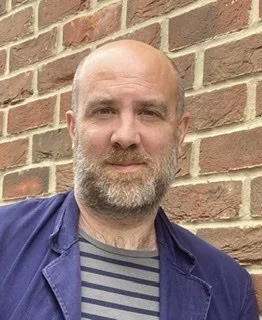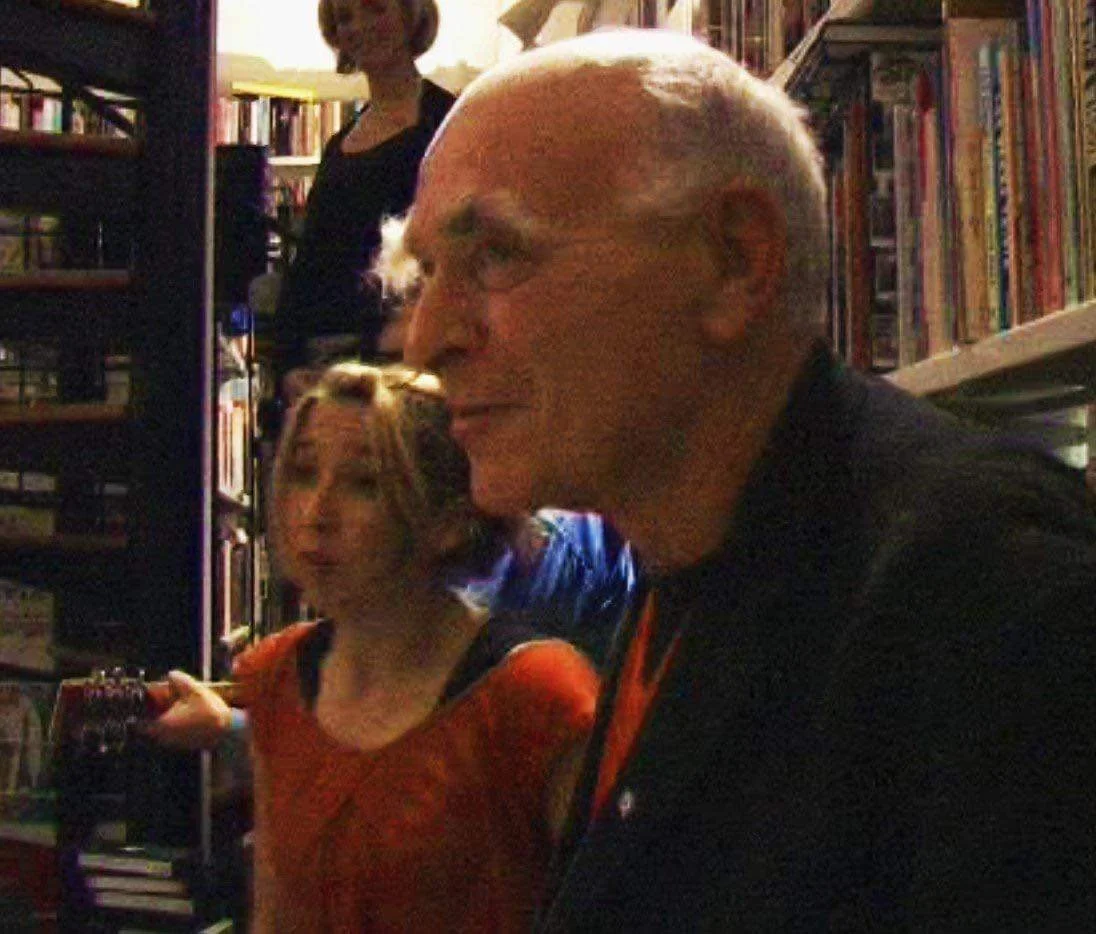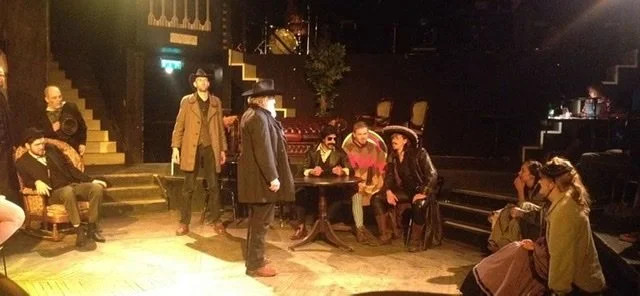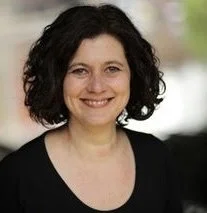Pictured clockwise: Angie Waller , Trevor Fleming and Ian Hayles of Impropriety; Mark Smith of Hoof!; Ken Campbell (image courtesy Liverpool Everyman & Playhouse); Liverpool Comedy Improv’s Emma Bird
A WHILE back now, I was commissioned to write a long read feature about Liverpool’s improv scene, which in the end was never published. I spoke to an extremely talented and fascinating bunch of people - both quoted here and behind the scenes - and was really grateful for their time and input, so never wanted it to be for nothing. Since writing this last year I’m aware of some newer improv groups who are not included in this piece. But as some of the people involved have some new shows coming up this autumn, it seemed a good time to let this see the light of day. So here it is.
IN MOST kinds of live performance, if the person you’d paid to see fell off the stage, nodded off mid-scene, started hallucinating or began talking gibberish, you could surmise things had gone a bit wrong. In the land of improv, however, victory is often grasped from the jaws of the improbable – and for actors and audiences alike, that’s all part of the appeal.
Over the last 20 years Liverpool’s improv scene has had its peaks and troughs, and as the city rouses from its pandemic slumber, it’s an art form coming into its own again.
Spontaneous performance has had its place in everything, from drama student exercises to confidence-building therapy. From highbrow art to irresistible silliness, scratch the surface, and what you find in the city is a supportive scene of highly skilled collaborators who have trained and worked with pioneers and giants of the discipline; who brought one-of-a-kind events to Liverpool and created shows that became the stuff of legend.
It can be many things and go by different names - impro is generally the UK term for it; improv, which seems to roll a bit more easily off the tongue and is used throughout this piece, is the Americanism; the stuff that made Saturday Night Live and modern US sitcom culture.
In the bigger picture, prime time entertainers like Paul Merton and Sandi Toksvig were among those who first made a name shaping the UK scene in the mid-1980s, as part of the the London-based Comedy Store Players (also Josie Lawrence, recently the star of Our Lady of Blundellsands at the Everyman). The Comedy Store was inspired by the Los Angeles club of the same name, and was an early importer of stand up as we know it today.
That same decade here in Liverpool, organisations like Hope Street Ltd emerged as a hub of activity for training students of physical and devised theatre, inspiring fresh young talent in the city centre. And by the 90s, our home-grown alternative comedy club scene began to come into its own.
In time, mixing these influences together was Hoof!, which began in 2004 as a joint project between two of the city’s most acclaimed touring companies, Rejects Revenge and Spike Theatre. It started out as a group of performers doing a set at the Rawhide Comedy Club, playing short-form games. But the troupe – recognisable by their uniform black suits, and eventually being able to call upon an ensemble of more than 30 actors, musicians and technicians - wanted to move on to something more theatrical. They performed and learned from contacts in Los Angeles, and went on to become a popular fixture on the UK arts centre circuit.
Spike co-founder Mark Smith performed in Hoof!, having been passionate about improvised performance since his time as a student at JMU (where, incidentally, he now teaches). “It takes you back to being a child, where you sit and make things up,” he says. “As adults there is more and more distraction in life, and so there’s something joyous about it.
“Improvisation is basically learning how to listen. It’s the ability to watch, listen and respond, which are the key elements to anything in performance. It’s about it becoming second nature - being that much more tuned in makes you more alive on stage and generous as a performer.”
Actor and improviser Mark Smith
The likes of Hoof! were introducing audiences to long form - an expansion of the quick-fire wit and short sketches of TV’s Who’s Line is it Anyway, which is still often many people’s first and only point of reference to improv. But the idea was to move things on from that, creating longer shows and building up a narrative tension to earn bigger laughs.
Despite the pressure of being forced to entertain on the spot being the stuff of nightmares for most folk, for Smith, stage fright and nerves have never come into it. “There’s no going wrong, just happy accidents that take you on a journey,” he says.
This is figurative and literal; Hoof! once managed to build a show around him falling off the stage in its opening minutes. Still, his advice is thus: “I tell people - just walk on stage and it’ll take care of itself. And you’ll love it.”
In time, both Rejects Revenge and Spike would be forced to fold, victims of Arts Council funding cuts. After a lengthy hiatus, Hoof! did their final shows at the Unity Theatre in 2014.
***
The emergence of Hoof! was happening around the same time as an event that was to have a far-reaching impact on Liverpool’s improv scene – the return of Ken Campbell.
The inimitable theatre maverick, who was usually London based, first came to the city in the 1970s, forming the Science Fiction Theatre of Liverpool (something that would never fly in the capital, he said), and later on became artistic director of the Everyman for a year in 1980.
Productions like The Warp (24 hours long) and Illuminatus! were audacious, psychedelic trips of performance, the likes of which have never been seen before or since - the former even making The Guiness Book of Records as the longest play in the world.
Invited back to the Everyman for its 40th anniversary celebrations in 2004, Campbell was at the helm of a five-night residency dedicated to his obsession at the time: Improv. The show was Farting Around in Disguises, and it combined the talents of 20 professionals and 20 newcomers found in open auditions. As such, it gave a stage to the city’s home-grown talent, providing an experience that would inspire and influence their careers - in, as the Ev called it, “one unpredictable, unsurpassable, and unmissable week”.
Actress Keddy Sutton was one of them. It was, she says… “a bit anarchic”.
“Ken was quite honest and brutal with people, but when I auditioned, we just clicked,” she says. “He was a bit off the wall, like me. And he really liked to find weird skills within you, strengthen and hone in on them.”
Actress Keddy Sutton with Ken Campbell (image courtesy Keddy Sutton)
So among other things, Sutton went on to become the only female performer in his company School of Night, specialising in what Campbell referred to as “gibberish improv and diddlin’” (think a jaunty vocalisation of the tune of an Irish jig). They toured such illustrious venues as the (London) Royal Court, the Globe, and, one memorable evening, the home library of a big fan - the late TV prankster Jeremy Beadle. “We had to pick a book off his shelf and improvise a musical from a sentence out of it. It was really funny and bizarre – my claim to fame!”
She would go on to become a regular on stage at the Liverpool Royal Court, a member of the Everyman rep company, and one half of musical comedy duo Caz ‘n’ Britney – a madcap partnership with actress Gillian Hardie that showcased their spontaneous creativity and love of the absurd.
“Doing improv, you need to work as a team, your brain working constantly… we all knew each other inside out, and that’s when you can push people. That was just brilliant, and Ken loved that,” Sutton says.
“I’ll never forget my years with him and felt very honoured to be chosen. I just took a risk said yes – well… like you’re supposed to in improv, aren’t you?”
***
A group of young actors cut their teeth in Farting Around in Disguises and went on to take improv in the city to a new level again, in the form of Impropriety. It became one of the first companies in the UK, and one of very few ever outside of London, to master the art of the improvathon – an ultra-length non-stop performance, nearly two days long.
It began in 2008 with Oh Wait!, A 2008 minute (33 and-a-half-ish hours) continuous performance set on an ocean liner, split into two-hour episodes with short breaks in between. Audiences could come and go, stay for one episode, watch the whole thing, or even bring sleeping bags for the overnight shifts. It was supposed to be an event to mark Liverpool’s Capital of Culture year; it ended up being a tribute to Campbell, who passed away suddenly before it took place.
He had brought the concept of the improvathon to the UK with Canadian performers Dana Andersen and Davina Stewart of Die-Nasty, an Edmonton-based company famous for the 50 hour Soap-A-Thons it has run since 1993 (hence the name, a riff on the classic TV series Dynasty). Andersen, an alumni of the famous Second City improv troupe, was a comedy partner of a certain Mike Myers back in the day. He hit it off with Impropriety and took part in several of their marathon shows, which ran annually until 2018.
Canadian improv legend Dana Andersen (centre) onstage in the Liverpool Improvathon at the Kazimier
“Our vision was to take over the world with improv,” laughs company director Angie Waller. “To get it more well known, and for people to know more than Who’s Line is it Anyway.”
Angie went on to develop the character Nana Funk, expanding what started as a cabaret turn into full-length shows - with the chat, and sometimes the songs, all made up on the night. Her biggest to date, Tough Old Bird, tours the region this autumn.
“It’s still scary to do,” she says. “But you trust your brain will kick in and know what it’s doing.
“And if it doesn’t, it doesn’t… Quite often, things going wrong are a gift. But I love the ‘freeness’ of it, the audience seeing things at the same time as the actor – it’s a really lovely relationship. You forget how you get through an improvathon and how tired you are – although I did fall asleep on stage in one.” Actors in improvathons have described how the lack of sleep can make them hallucinate, or hit a wall of existential despair; buddying up with another cast member for the duration helps to slap them out of it and keep on going to the end.
Impropriety also admired the way Die-Nasty catered for younger audiences, including a family-friendly ‘children’s hour’ in their Soap-a-Thons and running workshops in schools. This was something they went on to replicate in Liverpool, their community work enabling them to become a Community Interest Company or CIC.
The company had two much-loved spiritual homes, Mello Mello (now The Merchant) and the Kazimier (now boring flats). When they were lost, it became increasingly difficult to find the right venues for its needs; the company disbanded during the pandemic.
***
Enter Emma Bird, a teacher and performer who found herself moving back to her home region in 2014. Keen to fly the flag for the art form, she founded Liverpool Comedy Improv the following year and began running workshops – not just for performers, but anyone needing a bit of fun and a confidence boost.
Liverpool Comedy Improv’s Emma Bird
“A lot of actors won’t touch improv with a barge pole because they’re scared,” she says. “But I get people from all walks of life, and I’ve seen the benefits it has – it’s something really life-affirming.”
Bird had been a member of Brighton improv company The MayDays, and performed in two Liverpool improvathons. “I was introduced to it through acting, as a warm up or to devise a piece,” she says. “But I entered it looking for playtime, and comedy. It’s fun and silliness, and it’s funny, and anyone can do it – everyone should do it. It makes the world a better place!”
The years of funding cuts, lost venues, and a pandemic of course, have taken a toll on Liverpool’s improv scene. Compared to Brighton, Bird says, the scene here has seemed much more niche. But it has always managed to start again – and bring something new to the table each time.
All of which leads us back round to former Hoof-er, Mark Smith, who recently launched Wing It Impro & Stories, a new company with a focus on ‘reclaiming storytelling for adults’.
Influenced by the likes of stand up raconteurs like Mark Thomas and the late Jeremy Hardy, it has begun hosting events in venues and online, and a programme of workshops.
“I’d been itching to get back into producing and creating events and work – that sense of feeling the fear and doing it anyway, jumping in with both feet,” says Smith.
And along with some long-term collaborators Wing It has certainly done that, finding itself at the heart of the inaugural programme of the new Shakespeare North Theatre, with completely improvised new show The Incomplete Works of Shakespeare there later this month.
Smith and Bird are also working together to bring something new to the city again: FOIL, or Festival of Improvisation, Liverpool, now scheduled for April next year and something many think is a long overdue celebration of what we can do.
For Smith, it’s a chance to reignite the grass roots scene and attract a new generation of students, performers, and audiences to the discipline.
“What I want to do is re-launch spontaneous work in the city,” he says. “You don’t need a great deal of set or cast, it’s something that can work effectively in a post-pandemic world.”
For Bird, it’s getting us noticed for it again. “It’s an exciting project to get improv on the map in Liverpool,” she says. “It could be something spectacular and unique that puts the north in the spotlight.”







